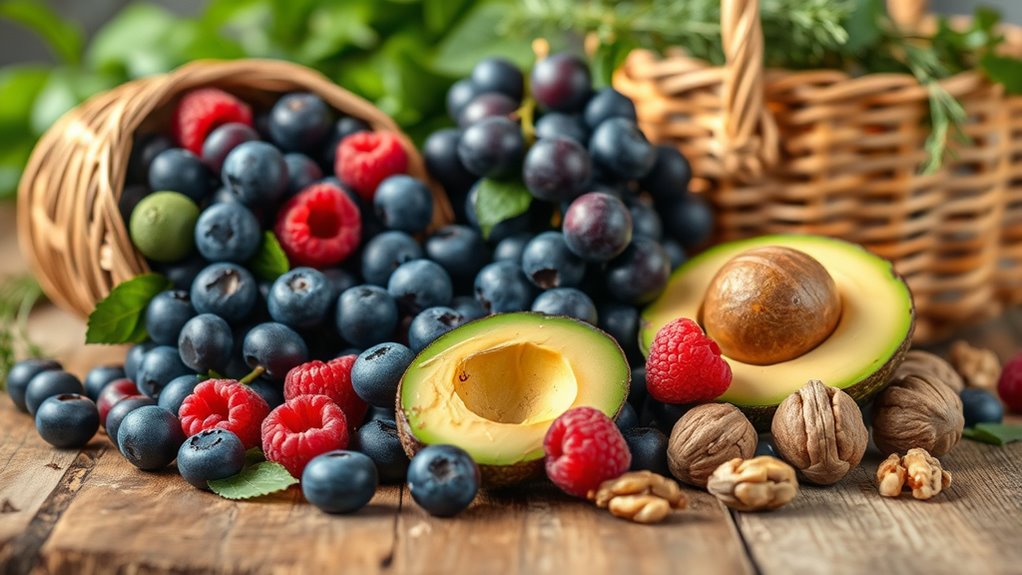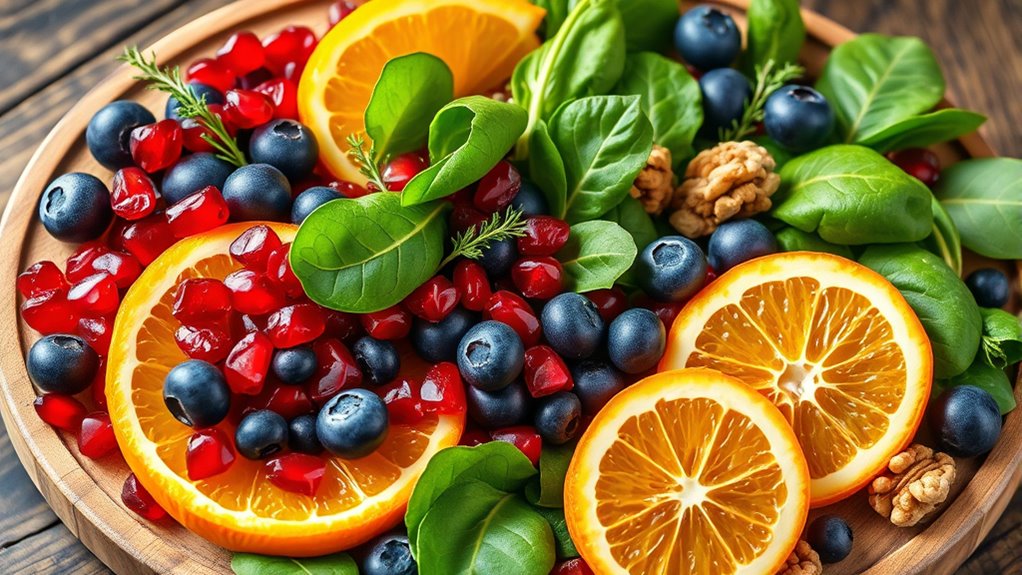To support longevity, incorporate functional foods rich in amino acids and probiotics into your diet. These nutrients help with tissue repair, immune function, and reducing inflammation. Foods like fermented dairy, yogurt, kefir, and plant-based options provide both probiotics and amino acids that promote muscle health and gut diversity. Maintaining a varied, consistent intake of these foods enhances cellular repair and resilience over time. Keep exploring to discover how you can optimize your long-term health naturally.
Key Takeaways
- Incorporate fermented dairy and plant-based products rich in probiotics to maintain gut health and immune function.
- Consume foods high in amino acids, such as eggs, fish, and legumes, to support tissue repair and metabolic health.
- Combine amino acids and probiotics through fortified foods for synergistic effects on muscle maintenance and immune defense.
- Focus on diverse, nutrient-rich diets that promote cellular repair and reduce inflammation for healthy aging.
- Regularly include functional foods designed to enhance resilience, repair, and overall wellness to support longevity.

As more people seek ways to live longer and healthier lives, incorporating functional foods into your diet can make a meaningful difference. These foods are specially designed to provide health benefits beyond basic nutrition, often packed with bioactive compounds that support your body’s resilience and aging process. Two key components to look for are amino acids and probiotic strains, both of which play essential roles in maintaining longevity and overall wellness.
Incorporate amino acids and probiotic strains to promote longevity and overall wellness.
Amino acids serve as the building blocks of proteins, which are necessary for repairing tissues, supporting immune functions, and producing enzymes and hormones. Certain amino acids, like glutamine and arginine, help reduce inflammation and boost your immune response, both critical for healthy aging. Including foods rich in these amino acids—such as eggs, fish, dairy products, and plant-based sources like legumes and nuts—can help sustain muscle mass, enhance metabolic health, and improve overall vitality. Additionally, some functional foods are fortified with specific amino acids designed to target age-related decline, making them a strategic addition to your diet.
Probiotic strains are another fundamental element in supporting longevity. These beneficial bacteria, found in fermented foods like yogurt, kefir, sauerkraut, and kimchi, help maintain a healthy gut microbiome. A balanced microbiome is essential because it influences nutrient absorption, immune function, and even mental health. As you age, your gut’s diversity and function may decline, increasing susceptibility to infections and chronic diseases. Consuming probiotic-rich foods regularly can help restore this balance, promote better digestion, and reduce inflammation—factors closely tied to aging and age-related illnesses.
Incorporating functional foods that contain both amino acids and probiotic strains can synergistically enhance your health. For example, fermented dairy products like yogurt not only supply probiotics but also contain high-quality proteins and amino acids that support muscle maintenance and immune defenses. Similarly, fortified plant-based products might offer amino acids along with probiotic cultures, making them ideal for vegetarians or those with dairy sensitivities. Moreover, understanding the importance of nutrient diversity can help you choose a wider range of foods to maximize health benefits.
To maximize the benefits, focus on a varied diet that includes different sources of amino acids and probiotic foods. This approach ensures you’re getting a broad spectrum of nutrients that work together to support cellular repair, reduce inflammation, and strengthen your immune system over time. Remember, consistency is key; integrating these functional foods into your daily routine can greatly contribute to a healthier, longer life.
Frequently Asked Questions
Can Functional Foods Replace Traditional Medical Treatments for Aging?
Functional foods alone can’t replace traditional medical treatments for aging. You should focus on holistic approaches and lifestyle modifications, like balanced diets, exercise, and regular check-ups, to support healthy aging. Incorporating functional foods can complement these efforts, boosting your overall well-being. Remember, combining medical care with healthy habits provides the best strategy for aging gracefully and maintaining quality of life over time.
Are There Any Risks Associated With Consuming Functional Foods Regularly?
Like steering through a garden, consuming functional foods regularly has its pitfalls. You might face potential allergen risks or unexpected interactions with medications, which can be like weeds disrupting your health. While they boost your well-being, overdoing it could cause adverse effects. Stay vigilant, read labels carefully, and consult your healthcare provider to guarantee these foods help rather than harm your journey to longevity. Balance is key to harvesting their benefits safely.
How Do Genetics Influence the Effectiveness of Longevity Foods?
Genetic variation plays a significant role in how effectively longevity foods work for you. Your unique genes influence your nutritional response, meaning some foods may boost your health more than others. You might find certain nutrients improve your aging process, while others have less impact. So, understanding your genetics can help tailor your diet to maximize the benefits of longevity foods and support your overall health.
What Is the Optimal Daily Intake of These Functional Foods?
You should aim for daily intake guidelines that include 1-2 servings of longevity-supporting foods like berries, nuts, or green leafy vegetables. Serving size recommendations often suggest about half a cup of berries, a small handful of nuts, or a cup of cooked greens. Consistency is key; incorporating these into your meals daily maximizes their benefits and supports your overall health and longevity.
Do Functional Foods Benefit Everyone Equally Regardless of Age or Health Status?
You might think functional foods benefit everyone equally, but that’s not the case. Age-related absorption can markedly impact how your body processes these foods, and dietary restrictions may limit their benefits. While some age groups or health conditions see impressive results, others might not notice much change. So, you should personalize your intake, considering your age, health status, and dietary needs, to truly reveal their longevity potential.
Conclusion
Incorporating functional foods into your diet can markedly boost your chances of living longer. For example, studies show that people who regularly eat antioxidant-rich foods like berries and nuts have a 30% lower risk of age-related diseases. By choosing these foods, you’re not just nourishing your body but also investing in a healthier, longer life. Make small, consistent changes today — your future self will thank you for it.









